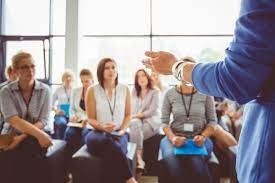Since the business world is ever-changing, good leadership is paramount. Globalization, the digital revolution, and changing workforce dynamics as the world moves towards freelance and remote work have made strong leaders more important than ever. Leader development is fostered within organizations using corporate workshops and the tools used to nurture these competencies. To understand the importance of corporate workshop sessions on leadership, their structure, and how it affects individuals and organizations, we would need to discuss each aspect in depth.
Not only for firms but especially in the corporate world, leadership matters
Every successful endeavor consists of a strong leadership coaching team. Great leaders not only deliver results but also foster a healthy: motivating work environment that enables teamwork, creativity, and employee commitment. It is their task to establish the vision and direction, make strategic decisions, guide through difficulties, and ensure that their teams feel engaged and motivated. In a corporate environment, the leaders span from the team leader and project manager through to executives and CEOs. The responsibilities of leadership grow at each level, but the fundamentals remain universal: establish trust, communicate clearly, and enable your people. That is when corporate workshops come as a game changer.
Leadership Workshops Goals
The objectives of conducting corporate workshops on leadership are as follows:
Learn skills: Workshops teach participants how to be a good leaders This may involve areas like communication, conflict resolution, decision-making, and emotional intelligence.
Leaders need to be self-aware of what they are good at and not so good at to lead others. Many workshops also feature self-assessment tools and feedback loops that provide participants with insights into their leadership style as well as growth opportunities.
Team Building: Successful leaders learn how to create strong teams. Workshops foster team-building activities to coordinate, trust, and develop character amongst the attendees.
Vision and Strategy Alignment: Workshops align the corporate vision, leadership vision, and strategic goals with individual goals. This presents a unified goal for everyone to be striving towards.
Intercultural Competence: In an increasingly globalized workplace with diverse cultures and perspectives, leaders must know the importance of including all aspects. Workshops will help promote cultural competence and an inclusive work environment for amicable working relations.
Leadership Training Workshop Structure
A day of the run-of-the-mill corporate leadership workshop can take anywhere from less than a full day to several days, having regard to companies’ objectives and the richness of material in question. This is how these workshops are generally organized.
1. Introduction and Icebreakers
In the next episode of this article, we will talk about a first aid course for novices: what is a first experience workshop delivered by experts? Icebreaker activities are commonly included for participants to feel welcome and better connected with the conference. They serve as a networking and rapport-building activity amongst the participants.
2. Keynote Sessions
Keynotes are given by internal or external leadership experts providing insights, experiences and best practices. Purpose: This is more like a motivation session for the participants and it will help to ring the bell of the workshop.
3. Interactive Workshops
The heart of the sessions is the interactive workshops where participants participate in group discussions, role-playing exercises, and case studies. So they can practice and test theoretical concepts with real-world experience to grow their learning.
4. Self-Assessment and Feedback
The participant might fill out a personality test, or answer some questions regarding leadership style. Assessment: These assessments can provide valuable information as to what are the strengths of an individual and areas for growth. Additionally, peer feedback can be used to encourage a constructive criticism culture.
5. Action Planning
Workshops frequently also feature an action planning session to ensure that learning leads directly and immediately to concrete outcomes. The participant develops specific goals and strategies that s/he will take as a leader, indicating the path of his/her growth.
6. Follow-Up and Support
Post-workshop, they can also offer continuous help using coaching, mentoring, and subsequent sessions. This strengthens their growth and reinforces the practice that they were doing in the workshop.
How Leadership Workshops Make a Difference?
Corporate workshops on leadership teach more than the people who attend. When a company engages in leadership development, it can expect many positive results, including:
Improved employee engagement: When employees believe their leaders are well-trained, they tend to be more motivated and engaged.
Improved Leadership Skills: Good leadership coaching near me helps to build better dynamics, which directly impacts the overall productivity and collaboration of team members.
Talent Retention: Companies that emphasize leadership development promote an environment of advancement and further encourage top talent to stay with their organization which is another reason to invest in leadership development.
Innovation and Adaptability: great leadership encourages innovation, prompting creativity to take risks in a culture. This adaptability is necessary for companies in a changing environment to survive.
Leadership Development: Leadership workshops foster a more positive organizational culture that is built on open communication, trust, and mutual respect.
Conclusion
The above should concretize the fact that leadership is a soft skill, and like all soft skills, corporate workshops on leadership are not just another item to be ticked off in an organization’s to-do list, they are THE investment every organization needs to make to have effective leaders adept at navigating turbulent business waters. They are workshops that build skills of the mind and body in self-awareness, team building, and cultural competency—to lead authentically and activate others. Strong leadership leads to a positive trickle effect throughout the organization, showing up in improved employee engagement, better performance, and a more engaged corporate culture. Given the current state of business development, elaborating leadership improvements through corporate workshops is essential for sustainable future growth.



